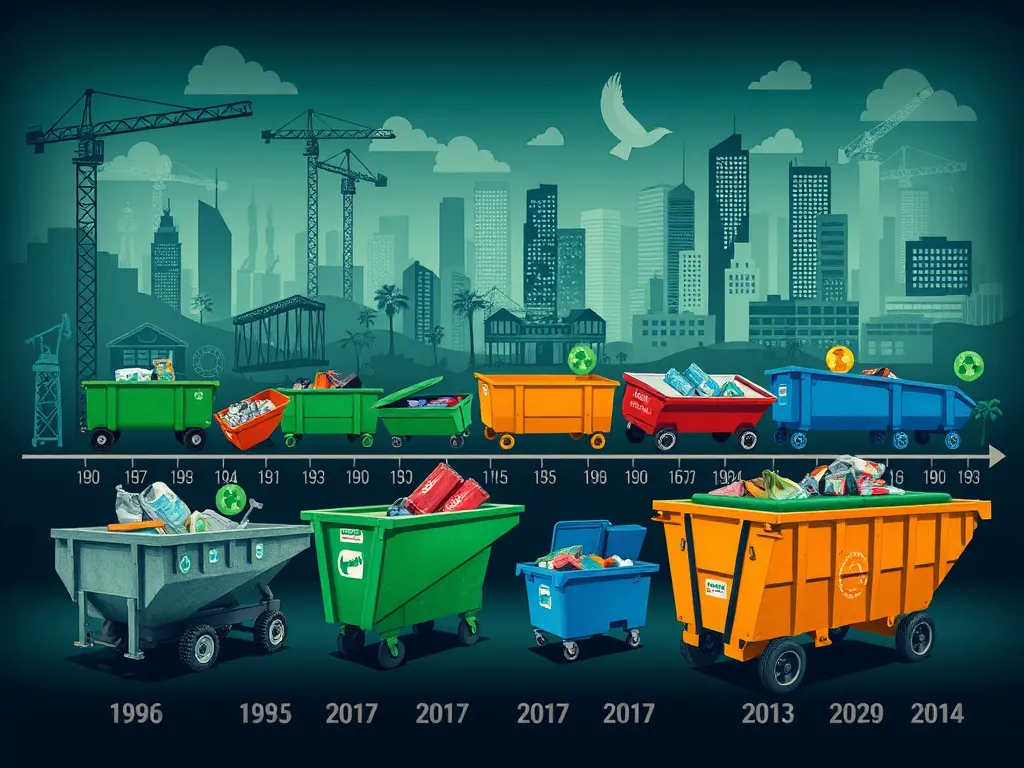A Brief History of Dumpster Rental and Its Evolution

A Comprehensive Exploration of Dumpster Rental History
The Dumpster Rental History is a fascinating journey through the evolution of waste management and disposal methods. Beginning in the early 20th century, dumpster rentals have transformed the way we manage and eliminate waste, adapting to social, environmental, and technological changes over the decades.
In this exploration of Dumpster Rental History, we will delve into the significant milestones that have shaped the industry, from its early origins to modern innovations. As urbanization and industry grew, so too did the need for effective waste management solutions, leading to the popularization of dumpster rentals.
The progression of Dumpster Rental History reflects broader societal trends, including environmental awareness and the impact of technology on logistics and service delivery. This narrative unfolds through various key periods that highlight the significance of waste management in both urban and rural settings.
Understanding Dumpster Rental History allows us to appreciate the complexities of waste disposal and the importance of sustainable practices. As we venture through this history, we will also consider the future of dumpster rental services in an increasingly eco-conscious world.
From the challenges of early waste management practices to the current innovations shaping rental services, the Dumpster Rental History is a testament to human ingenuity and adaptability in the face of changing environmental needs.
The evolution of urban waste management can be explored through various resources, including the concept of a https://en.wikipedia.org/wiki/Dumpster.
Early Origins of Dumpster Rental
The inception of the dumpster concept can be traced back to the 1930s, with the work of George Dempster, a Des Moines, Iowa, businessman. Dempster developed an efficient way to transport large amounts of refuse by designing a metal container that could be easily loaded onto trucks. This invention marked the genesis of the dumpster rental industry, offering a more convenient method of waste disposal than traditional methods.
The urgency for efficient waste management surged during World War II, when cities were faced with increased waste due to war efforts and a growing population. The military’s demand for quick clean-up and efficient disposal methods led to the widespread adoption of dumpsters, which facilitated faster waste collection in urban areas.
The earliest dumpster designs were primarily made of metal, which provided durability and strength. These designs were simple but effective, allowing various sizes to be created to suit different waste management needs. The standardization of dumpster sizes began in this era, setting the foundation for future rentals.
Development in the 1960s and 70s
The 1960s and 70s were pivotal decades for the construction industry, leading to an explosion in demand for dumpster rentals. As cities expanded and construction projects flourished, the need for robust waste management solutions became increasingly apparent, fueling the growth of dumpster rental companies.
During this period, specialized dumpster sizes were introduced to cater to the unique needs of different waste types. Construction companies, for instance, required larger dumpsters for debris, while residential rentals saw the emergence of smaller containers for household waste. This diversification in sizes helped streamline waste management across various sectors.
As awareness of environmental issues began to rise in the late 1970s, so did the focus on responsible waste disposal practices. Regulators started to implement guidelines that encouraged recycling and proper waste segregation, prompting dumpster rental services to navigate new environmental considerations.
Modern Innovations in Dumpster Rental
In recent years, dumpster rentals have benefitted from technological advancements leading to innovations in design and efficiency. Contemporary dumpsters are often constructed with stronger materials that enhance durability and provoke a longer lifespan while minimizing environmental impact.
Regulatory frameworks have continued to evolve, influencing dumpster rental practices. Companies now often must comply with local waste disposal regulations, which guide the types of waste that can be placed in dumpsters and establish proper disposal methods, fostering a more responsible approach to waste management.
The rise of digital technology has also transformed the dumpster rental landscape. Many companies now provide online booking systems that allow customers to reserve dumpsters quickly and efficiently. This convenience has made renting dumpsters more accessible to both residential and commercial clients.
Regional Variations in Dumpster Rental
Across the United States, dumpster rental practices vary significantly from one region to another, reflecting local waste management policies and community norms. In densely populated urban areas, for example, dumpster sizes may be smaller due to space constraints, while rural areas may see larger rentals to accommodate construction or agricultural needs.
Internationally, dumpster rental practices reflect diverse cultural attitudes toward waste management. In countries with rigorous recycling programs, dumpsters may be designed specifically for materials that divert waste from landfills, promoting sustainability and responsible disposal.
Cultural attitudes also play a crucial role in defining waste management norms. Societies prioritizing environmental care may witness a higher demand for eco-friendly dumpster rental options, showcasing the intersection of local values and rental practices.
Future Trends in Dumpster Rental
Looking ahead, sustainability appears set to dominate the dumpster rental industry. The emergence of eco-friendly dumpster options, such as containers designed for easier recycling and waste sorting, indicates a shift towards greener waste management solutions.
The impact of smart technology on rentals is another trend to watch. Innovations such as GPS tracking, smart booking systems, and automated scheduling may revolutionize the logistics of dumpster rentals, making the process more efficient, transparent, and customer-centric.
As the dumpster rental market continues to evolve, predictions suggest a growing demand for sustainable practices, leading to a more robust focus on environmental stewardship within the industry. Adaptability and innovation are key as dumpster rentals face the challenges of tomorrow.
